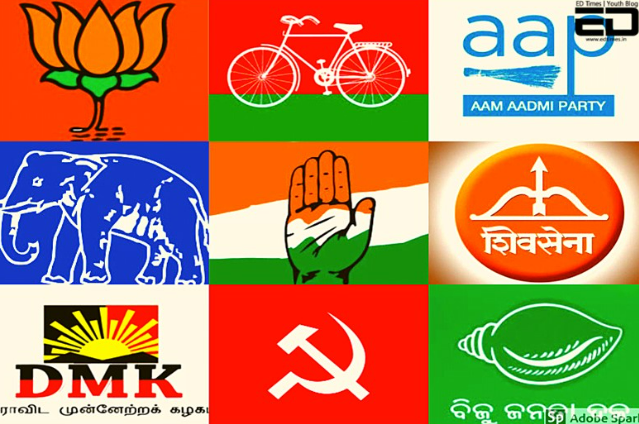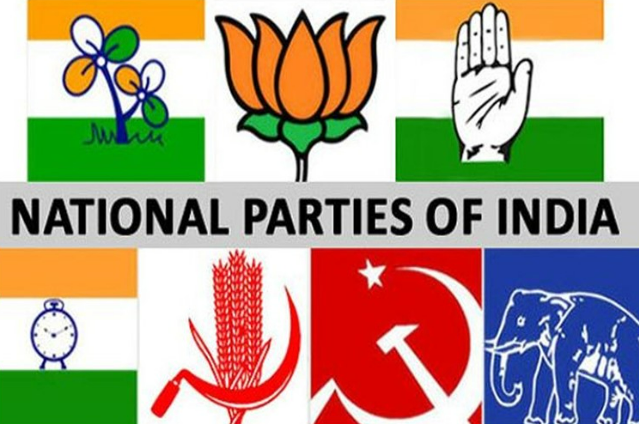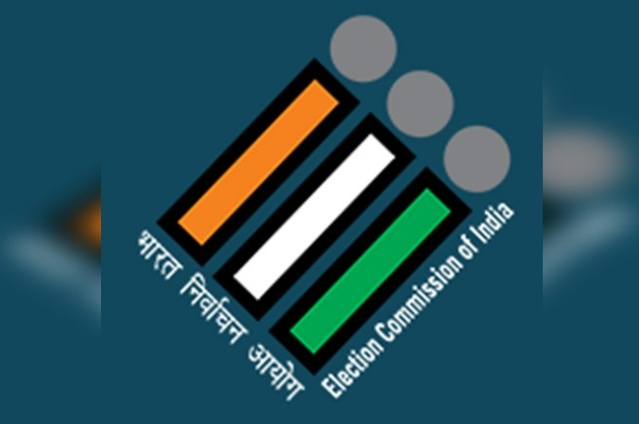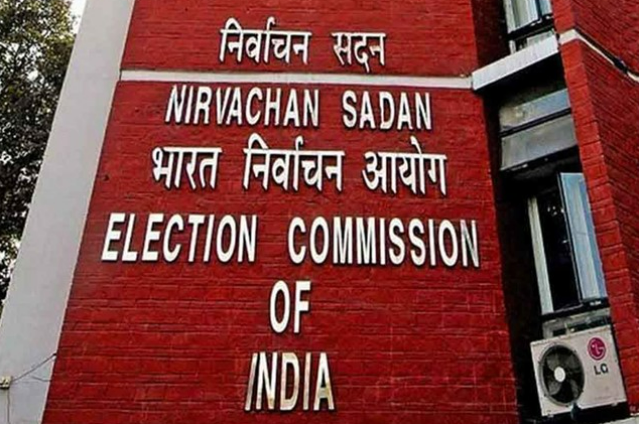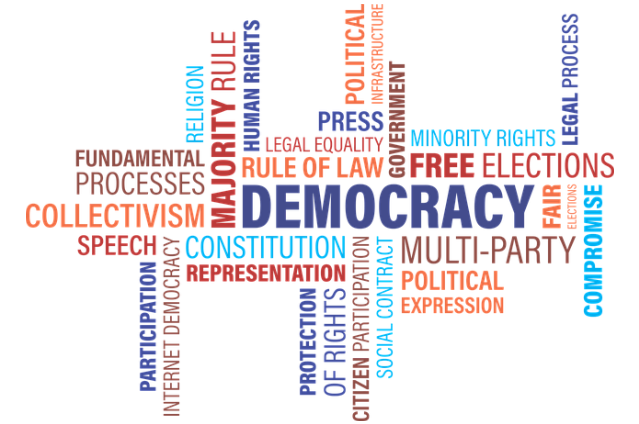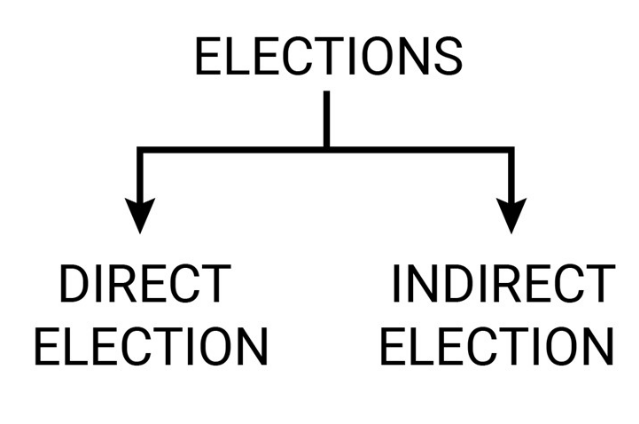
Introduction
The modern government derives it's strength from the people who directly and indirectly control the government through their political rights especially through the right to vote. The exercise of franchise by the citizens in the choice of their government is known as election. The particular act of choice is known as voting. The people who enjoy the vote are termed as voters or electors and collectively they form the electorate. Right to franchise is exercised by the citizens either for the choice of their representatives or for expressing approval of a particular measure put before the people. In a democracy, elections are thus most important, so is their study as to how they are conducted. That bring to focus the qualifications of the electorate and the various theories and methods of suffrage and representation. The electorate is so crucial that it can be assessed from the fact that some writers regard it as one of the organs of government on the same level as the legislature, the executive and judiciary. In a way, it is superior to all of them. Read on, to enter the gateway of democracy so as to understand the resurgence of electoral politics.
Meaning of Democracy
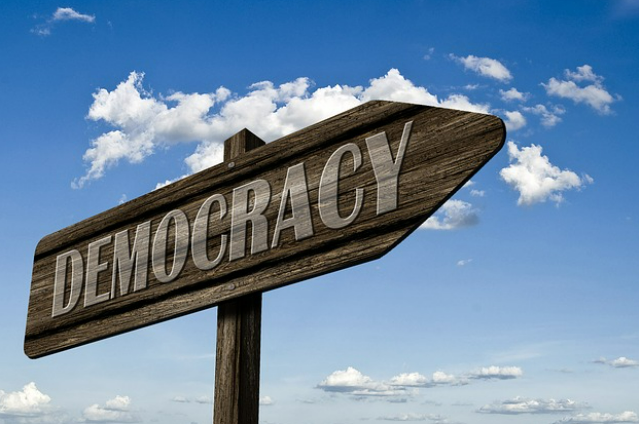
A democracy is a form of government in which the rulers are elected by the people. This serves as a good idea to understand the starting point of democracy. Countries like Myanmar and Pakistan have predominance of military rule. Kings are present in countries like Nepal and Saudi Arabia. Democracy is simply people's rule. Democracy is a form of government in which the major decisions are taken by the elected leaders. USSR has a formally elected parliament but cannot be regarded as a democracy as the determining voice of the country is with the Politburo. The US government in Iraq is also an example of the same. Hence, it is said that a country can only be regarded a democracy when the final decision making power rests with those elected by the people.
Holding elections of any kind is not sufficient. The elections must offer a real choice between political alternatives. And it should be possible for people to use this choice to remove the existing rulers. Hence, a democracy must be based on a free and fair election where those currently in power have a fair chance of losing. The struggle for democracy is also linked to the demand of a Universal Adult Franchise. Although this principle has come to be accepted almost all over the world. Democracy is based on the fundamental principle of political equality. In a democracy, each adult citizen must have one vote and each vote must have one value.
Popular governments can be undemocratic too. The leaders can take the shape of a dictator. Presence of elections in a democracy is important. But it is equally important to look before and after the elections. There should be sufficient room for normal political activity, including political opposition, in the period before elections. This requires that the state should respect some basic rights of the citizens. They should be free to think, to have opinions, to express them in public, to form associations, to protest and take other political actions. Everyone should be equal in the eyes of law. These rights must be protected by an independent judiciary whose orders are obeyed by everyone.
A democratic government cannot do whatever it likes just because it has won an election. It has to respect some basic rules. In particular it has to respect some guarantees to the minorities. Every major decision has to go through a series of consultations. Every office bearer has certain rights and responsibilities assigned by the constitution and the law. Each of these is accountable not only to people but also to other independent officials. Hence, a democratic government rules within the limits set by constitutional laws and citizens rights.
Reasons for Democracy

A democracy is considered the best form of government. Democracy is better than other forms of government in responding to the needs of people. A non-democratic government may and can respond to the people's needs, but it all depends on the wishes of the people who rule. If the rulers don't want to, they don't have to act according to the wishes of the people. A democracy requires that the rulers have to attend to the needs of the people. A democratic government is a better government because it is a more accountable form of government. Democracy is based on consultation, discussions and decisions. A democratic person always involve many persons, discussions and meetings. When a number of people put their heads together, they are able to point out possible mistakes in any decision which takes time. But there is a big advantage in taking time over important decisions. This reduces the chances of rash or irresponsible decisions. Thus democracy improves the quality of decision-making.
Democracy provides a method to deal with differences and conflicts. In many society, people are bound to have differences of opinions and interests. These differences are particularly sharp in a country like ours which has an amazing social diversity. People belong to different languages, practice different religions and have different castes. They look at the world very differently and have different preferences. The preferences of one group can clash with those of other groups. The resulting conflict can be solved by brutal power. Whichever group is more powerful will dictate its terms and others will have to accept that. But that would lead to resentment and unhappiness. Different groups may not be able to live together for long in such a way. Democracy provides the only peaceful solution to this problem. In democracy, no one is a permanent winner. No one is a permanent loser. Different groups can live with one another peacefully. In a diverse country like India, democracy keeps our country together. Hence, we summated the effect of democracy on the quality of government and social life. Even if democracy does not bring about better decisions and accountable government, it is still better than other forms of government. Democracy enhances the dignity of citizens. As we have mentioned already that democracy is based on the principle of political equality on recognizing the poorest and the least educated has the same status as the rich and the educated. People are not subjects of a ruler, they are the rulers themselves. Even when they make mistakes, they are responsible for their conduct. Lastly, democracy is better than other forms of government because it allows to correct its own mistakes. In a democracy, there is a space for public discussion on these mistakes. And there is a room for correction as well. Either the rulers have to change their decisions or the rulers can be changed. This cannot happen in a non-democratic government.
There are arguments that we regularly hear against democracy such as, leaders keep changing in a democracy leading to instability in the form of government. Democracy is all about political competition and power politics which endangers morality in most of the situations. Democracy involves the discussion of a lot of people which leads to delays. Democracy leads to corruption for it is based on electoral competition. Commoners do not know their best interest and the leaders elected cannot also guarantee them that.
Democracy as a form of government only ensures that people take their own decisions. This does not guarantee that their decisions will be good. People can make mistakes. The process may lead to delays. Such argument may let the reader conclude that the democracy of the kind we see may not be the ideal form of government. To put it simply, democracy cannot get us everything and is not the solution to all problems. But it is clearly better than any other alternative than we know. It offers better chances of a good decision, it is likely to respect people's own wishes and allows different kinds of people to live together. Hence, democracy is considered the best form of government.
Every democracy has to realize the ideals of a democratic decision-making. What we do as citizens can make a difference to making out country more or less democratic. This is the strength and the weakness of democracy as the fate of the country depends not just on what the rulers do, but mainly what we, as citizens do. Democracy involves the active participation of citizens in the political affairs of the country hence becoming the subject matter of democratic politics.
According to Bassett, democracy is essentially a matter of political method. Democracy is not a particular kind of civilization. Democracy reconciles freedom with the need for law and it's enforcement. It may be defined as a 'political method by which every citizen has the opportunity of participating through discussion in an attempt to reach voluntary agreements as to what should be done for the good of the community as a whole. In fact, democracy is not only a form of government it is also a way of life. Abraham Lincoln has put it very beautifully, 'Democracy is the government of the people for the people and by the people.'
Democracy recognises the worth of a man. The foundation of democracy is faith in the capacities of human nature, faith in human intelligence and in the power of pooled cooperative existence. It is in the democracy only where the common welfare can be promoted. J.S.Mill puts it, 'the participation in governmental affairs lifts the individual above the narrow circle of his egotism and broadens his interests. Democracy makes an individual interested in his country and gives him a sense of responsibility. Democracy strengthens the love of country because citizens feel that the government is their own creation and the rulers their servants rather than masters. This conception imbibes in them the spirit of patriotism and nationalism. A democratic government cannot go totalitarian as it is subject to regular and constant criticism and popular pressure. Opposition parties keep the healthy functioning of democracy through its constructive criticism. Democracy avoided suppression of thought and action. Dr. Lindsay observes, 'A democratic society sure of itself can be indefinitely elastic in it's methods. It can as in a time of crisis, give enormous powers into the hands of government, in cheerful confidence that, the crisis past, it can take them away.' In a democracy, all the people equally participate in the exercise of the sovereign power. Democratic laws would not be a command of the sovereign but would reflect the needs and respond to the impulses of the people. Democracy further adds greater educative value in the country. Democracy serves as a training school for citizenship; it strengthens patriotism and thereby minimises the possibilities of discontent and revolutions. Popular election, popular control and popular responsibility ensure not only efficiency in government but also stability in the state. Efficient government is no substitute for self-government. Democracy is superior to other forms of government because the rights and interests of every person are secure from being disregarded. Democracy works against the psychology of power since the government is amenable to the control of the people who can change them at any moment.
There is no denying of the fact that political democracy as it exists in most of the capitalistic states of the world today suffers from various drawbacks. But democracy itself is not at fault. The defects on the other hand lie in the socio-economic system in which it is made to fit. It is therefore essential that gross inequalities of wealth must be removed and ballot box brand of democracy must be supplemented with economic democracy. It is then and only then possibly to generate true spirit of democracy.
But this doesn't equates with the idea that political democracy is a total failure. The truth seems to be that democracy contains within it the seeds of it's own destruction and decay as well as of life and progress. Under unfavorable conditions, it may lead to despotism of mediocre majority, the negation of freedom, the free play of self-interest and the deterioration of individual and national character. But under unfavorable conditions, it encourages self-reliance, initiative and responsibility. It makes authority a trust and ensures equal consideration for all. It's strength depends upon the spiritual efforts that people put forth. It is excellence of individual character which has made Switzerland a model democracy in the world.
Capitalism during it's period of expansion brought about democracy in the world and the same system during the period of it's decline in bringing about dictatorship. Future of democracy hangs in the balance. It is standing on crossroads, leading to people's democracy and capitalist dictatorship.
In order to have a better democratic setup, we can introduce reforms in the electoral system. Ultra democratic devices like referendum, initiative and recall should be employed. These popular checks will keep democracy in proper health. Indifferent behaviour and reluctance on the part of citizens are the two enemies of democracy. Constant vigilance happens at the price of liberty. In the absence of vigilance, democracy is liable to be perverted. People should have awareness and knowledge in the working of democratic institutions. The citizens should have basic civic sense for the better functioning of the government. A keen spirit of toleration is essential for constructive criticism and healthy discussion. Absence of individual liberty dwarfs the process of democracy. The Constitution of India is always there to clear the room of doubts in the country. Democracy should never lose its self-corrective character.
'Man's capacity for justice makes democracy possible, but man's inclination to injustice makes democracy necessary.' --- Reinhold Niebuhr.
Importance of Elections
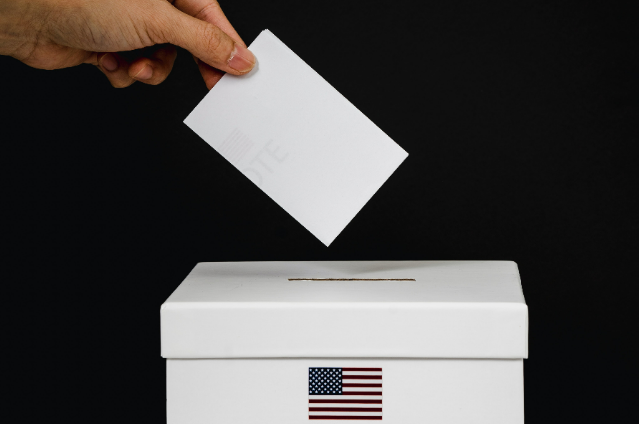
In almost every community of the world that has a very diverse and large population, a direct democracy can never be imagined. As it is not possible for everyone to have the time and knowledge to take decisions on all mattes. Hence, in most democracies people rule through their representatives. Selection of individuals on the basis of age, experience or knowledge will again be a cumbersome process.
Democracy provides every citizens the mechanism by which people can choose their representatives at regular intervals and change them if they wish to do so. This mechanism is called election. In an election, the voters make many choices:-
- They can choose who will make laws for them.
- They can choose who will form the government and take major decisions.
- They can choose the party whose policies will guide the government and law-making.
What makes an election democratic?
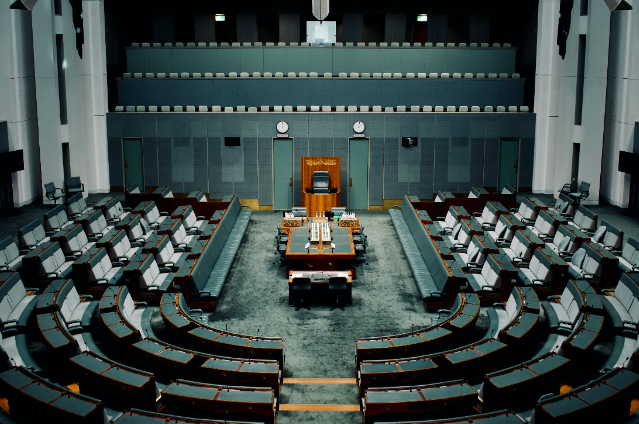
- First, everyone should be able to choose. This means that everyone should have one vote and every vote should have equal value.
- Second, there should be something to choose from. Parties and candidates should be free to contest elections and should offer some real choice to the voters.
- Third, the choice should be offered at regular intervals. Elections must be held regularly after every few years.
- Fourth, the candidate preferred by the people should get elected.
- Fifth, elections should be conducted in a free and fair maner where people can choose as they really wish.
Is it good to have political competition?
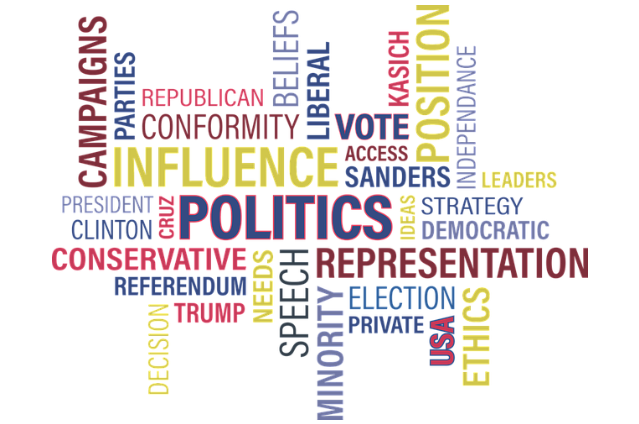
Elections are thus all about political competition. This competition takes various forms. The most obvious form is the competition among political parties. At the constituency level, it takes the form of competition among candidates. If there is no competition, elections will become pointless. An electoral competition is coupled with multiple demerits. It creates a sense of unity and factionalism in every locality. A lot of people keep on complaining about party-politics. Different political parties and leaders often level allegations against one another. Parties and candidates often use dirty tricks to win the elections. Some people say that this pressure to win electoral fights does not allow sensible long-term policies to be formulated. Some good people who wish to serve the country do not enter this arena. They do not like the idea of being dragged into unhealthy competition.
The Constitution makers were aware of these problems. Yet they opted for free competition in elections as the way to select our future leaders. They do so because this system works better in the long-run. In an ideal world, there is no state found as of conflicting interests. Political competition is part of practical world. Political leaders are motivated by the desire to advance their political careers. They want to remain in power or get power and positions for themselves. They may wish to serve the people but is risky to depend entirely on their sense of duty. Actually, regular electoral competition provides incentives to political parties and leaders. They know that if they raise issues that people want to be raised, their popularity and chances of victory will increase in the next elections. But if they fail to satisfy the voters with their work they will not be able to win again. So if a political party is motivated only by the desire to be in power, even then it will be forced to serve the people. It's similar to the way a market works. Even if a shopkeeper is interested only in his profit, he is forced to give good service to the customers. If he does not, the customer will go to some other shop. Similarly, political competition may cause divisions and some ugliness, but it finally helps to force political parties and leaders to serve the people.
In India, the Lok Sabha and Vidhan Sabha ( Assembly ) elections are held regularly after every five years. After five years, the term of the elected representatives comes to an end. The Lok Sabha or Vidhan Sabha stands to be dissolved. Elections are held in all constituencies at the same time, either on the same day or within a few days. This is called a general election. Sometimes election is held for only one constituency to fill the vacancy caused by death or resignation of a member. This is called a by-election. In our country we follow an area based system of representation. The country is divided into different areas for purposes of elections. These areas are called electoral constituencies. The voters who live in an area elect one representative. One of the features of a democratic election is that every vote should have equal value. That is why our Constitution should have a roughly equal population living within it. Each village or town is divided into several 'wards' that are like constituencies are counted as 'seats'. There are some reserved constituencies in our country as the Constitution makers were worried that in an open electoral competition, certain weaker sections may not stand a good chance to get elected to the Lok Sabha and the State Legislative Assemblies. They may not have the required resources, education and contacts to contest and win elections against others. Those who are influential and resourceful may prevent them from winning elections. If that happens, our Parliament and Assemblies would be deprived of the voice of a significant section of our population. That would make our democracy less representative and less democratic.
In a democracy it is the best to leave political parties and candidates free to conduct their election campaigns the way they want to. But it is sometimes necessary to regulate campaigns to ensure that every political party and candidate gets a fair and equal chance to compete. There are some election laws pertaining to the election campaign. No body can bribe or threaten the voters. No body can appeal the voters in the name of caste or religion. Political leader shall not use government resources for election campaign. All the political parties have actually conceded to a Model Code of Conduct. Elections are not that too expensive for a country like India.
What are Political Parties?

Meaning and Types:
Political parties are voluntary associations or organised groups of individuals who share the same political views and who try to gain political power through constitutional means and who desire to work for promoting the national interest. There are four types of political parties in the modern democratic states, such as,
- Reactionary parties which cling to the old socio-economic and political institutions.
- Conservative parties which believe in status-quo.
- Liberal parties which aim at reforming the existing institutions.
- Radical parties which aim at establishing a new order by overthrowing the existing institutions. In their classification of political parties on the basis of ideologies, the political scientists have placed the radical parties on the left and the liberal parties in the centre and reactionary and conservative parties on the right. In other words, they are described as the leftist parties, centrist parties and the rightist parties.
Party System in India
The Indian party system has the following characteristic features:
a) Multi-Party System: The continental size of the country, the diversified character of Indian society, the adoption of universal adult franchise, the peculiar type of political process and other factors have given rise to a large number of political parties. In fact, India has the largest number of political parties in the world.
b) One-Dominant Party System: A dominant position was enjoyed by the Congress since independence. Rajni Kothari, an eminent political analyst, preferred to call the Indian party system as 'one party dominance system' or the 'Congress system'. This is an exception to the multi-party system found in India.
c) Lack of clear ideology: Almost all the political parties have a clear-cut ideology. They have a close remembrance in their policies and programmes. Thus, politics is less issue-based rather than based on ideology and pragmatism.
d) Personality Cult: Parties are also organised around an eminent leader rather than by their manifesto. It is a fact that the popularity of the Congress was mainly due to the leadership of Nehru, Indira Gandhi and Rajiv Gandhi. Hence, it is said that there are political personalities rather than political parties in India.
e) Based on Traditional Factors: A large number of political parties in India are formed on the basis of religion, caste, language, culture, race and so on. These parties work for the promotion of communal and sectional interests and thereby undermine the general public interest.
f) Emergence of regional parties: Another significant feature of the Indian party system is the emergence of a large number of regional parties and their growing role such as BJD in Orissa and DMK in Tamil Nadu.
g) Factions and Defections: Factionalism, defections, splits, mergers, fragmentation, polarisation and so on have been an important aspect of the functioning of political parties in India. Practice of defections causes political instability and leads to the disintegration of parties.
h) Lack of effective opposition: An effective opposition is very essential for the successful operation of the parliamentary democracy prevalent in India. It checks the autocratic tendencies of the ruling party and provides an alternative government.
i) Recognition of National and State Parties: The Election Commission registers political parties for the purpose of elections and grants them recognition as national or state parties on the basis of their poll performance. The other parties are simply declared as registrered-unrecognised parties.
Conditions for Recognition as a National Party
- If the party secures 6% of valid votes polled in any four or more states at a general election to the Lok Sabha or to the legislative assembly; and in addition, it wins four seats in the Lok Sabha from any state or states.
- If it wins 2% of seats in the Lok Sabha at a general election, and these candidates are elected from three states.
- If it is recognised as a state party in four states.
The conditions for recognition as a State Party almost run parallel to the aforementioned. The national parties and state parties are also known as all-India parties are also known as all-India parties and regional parties respectively.
Elections
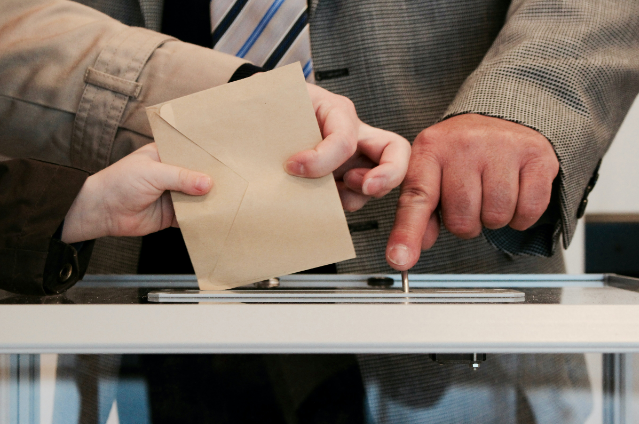
India has a parliamentary form of government. Here elections deal with the elections relating to all state assemblies, Union territories, Presidential and Vice Presidential Elections. According to the People Representative Act of 1950, the electoral were created to choose representatives from various constituencies to elect the representatives who are having the power to make the making of government and successful running the administration.
Elections in India
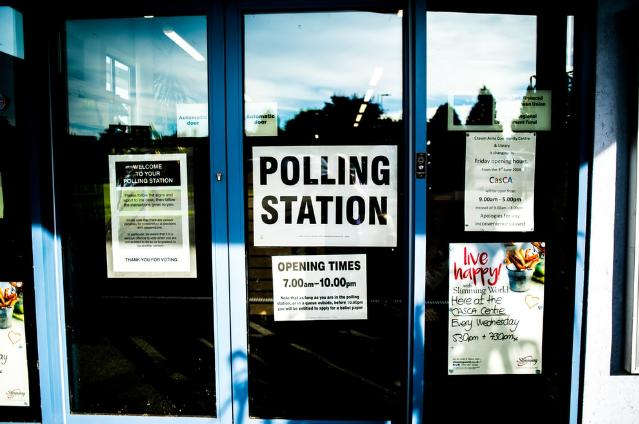
Features:
- Article 324-329 of Part XV of the Constitution covers election-related provisions.
- The Election Commission of India is the sole organisation that has been given authority under Article 324 of the Indian Constiution. The President shall appoint the Chief Election Commissioner (CEC) and other Election Commissioners.
- India has been divided into geographical constituencies with only one member. For both parliamentary and assembly elections, each constituency will have a single electoral roll and no one shall be excluded on the basis of religion, caste or sex.
- Every individual who is an Indian citizen and has reached an age of voting can vote. Only the corrupt or insolvent persons are not allowed to vote.
- The Constitution gives Parliament the authority for the preparation of electoral rolls, the delimitation of constituencies and all other measures necessary for securing their due constitution.
- The State Legislatures can also make provisions with respect to all matters relating to the elections to the state legislatures including the preparation of electoral rolls and all other measures necessary for securing their due constitution.
- The Constitution declares that the validity of any law relating to the delimitation of constituencies or the allotment of seats to such constituencies cannot be questioned in any court.
- The Constiution lays downs that no election to the Parliament or state legislatures is to be questioned except by an election petition presented to such authority and in such manner as presented to such authority and in such manner as provided by the appropriate legislature.
- Article 323B empowers the appropriate legislature ( Parliament or State Legislature ) to establish a tribunal for the adjudication of election disputes. Later, the Supreme Court declared this provision as unconstitutional.
Election Machinery
- Election Commission of India (ECI ) - Under Article 324 of the Constitution of India, the Election Commission of India is vested with the power of superintendence, direction and control of conducting the elections to the Lok Sabha and State Legislative Assemblies. It is a three-membered body.
- Chief Electoral Officer (CEO ) of a state or a union territory is authorised to supervise the election work in the state or union territory subject to the overall superintendence, direction and control of the Commission.
- Direct Election Officer ( DEO ) subject to the superintendence, direction and control of the Chief Electoral Officer, the District Election Officer supervises the election work of a district.
- Returning Officer ( RO ) of a Parliamentary or of assembly constituency is responsible for the conduct of elections in the Parliamentary or assembly constituency concerned.
- Electoral Registration Officer ( ERO ) is responsible for the preparation of electoral rolls for a Parliamentary/Assembly constituency.
- The Presiding Officer with the assistance of polling officers conducts the poll at a polling station.
- Observers are nominated by the Election Commission of India for Parliamentary and Assembly Constituencies. They are General Observers, Expenditure Observers, Police Observers, Awareness Observers, Micro Observers and Assistant Expenditure Observers. They do the work of supervising elections.
Election Process
- Time of Elections: Elections for the Lok Sabha and State Legislative Assembly have to take place after every five years, unless called earlier. It can be dissolved if a no-confidence motion passes against it.
- Schedule of Election: The Commission normally announces the schedule of the elections in a major press conference a few weeks before the formal process is set in motion. The formal process for the elections starts with the Notification or Notifications calling upon the electorate to elect Members of a House. The Commission also compiles the list of elected leaders and issues an appropriate notification for the due constitution of the House.
- Oath or Affirmation: It is necessary for a candidate to make and subscribe an oath or affirmation before an officer authorised by the Election Commission.
- Election Campaign: The election campaign is the period in which the political parties carry out the propaganda to secure the support of voters.
- Polling days: Polling is normally held on a number of different days in different constituencies.
- Ballot Papers and Symbols: Candidates of recognised party are alloted their party symbols. Ballot papers are printed with the names of the candidates.
- The Voting Procedure: It has changed from the secret ballot system which were usually set up in public institutions, such as schools and community halls. Since 1998, the Commission has started to use Electronic Voting Machines ( EVM's) instead of ballot boxes. It is a simple electronic device used to record votes, which eliminates the possibility of invalid votes, reduces the great quantity of paper used and reduces the overall cost of elections.
- Counting of Votes: After the polling has finished, the votes are counted under the supervision of Returning Officers and Observers appointed by the Election Commission. After the counting of votes is over, the Returning Officer declares the name of the candidate to whom the largest number of votes have been given.
- Media Coverage: In order to bring transparency in the process of elections, media is allowed to cover the details of elections although subject to maintaining the secrecy of the vote.
- Election Petitions: Any elector or candidate can file an election petition if he or she thinks there has been malpractice during the election.
Voting Behaviour
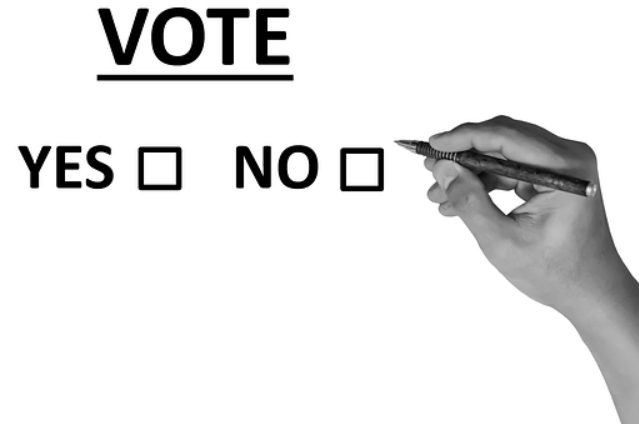
It is also known as electoral behaviour. It is a form of political behaviour. It implies the behaviour of voters in the context of elections in a democratic political system.
According to Plano and Riggs, 'Voting behaviour is a field of study concerned with the ways in which people tend to vote in public elections and the reasons why they vote as they do.
According to Gordon Marshall, 'The study of voting behaviour invariably focuses on the determinants of why people vote as they do and how they arrive at the decisions they make.'
Significance of Voting Behaviour:

Psephology, a branch of political science deals with the scientific study of voting behaviour. It is a term popularised by American theorists.
The study of voting behaviour is significant for the following reasons:-
a) It helps in comprehending the process of political socialisation.
b) It emphasises the real impact of revolutionary ballot box.
c) It enables to throw light as to how far the electoral politics continue to break with the past.
d) It helps in examining the values of democracy.
Voting behaviour can be regarded as:
- A mode of legitimising democratic rule.
- Instancing 'participation' in the political process involving integration into the political community.
- Instancing an act of decision-making.
- A role-action involving definite political orientation.
- A direct relation of the individual citizens to the formal government.
Determinants of Voting Behaviour:

a) Caste:- It is an important factor influencing the behaviour of votes. Politicisation of caste in politics has been a feature of politics.
b) Religion:- It is another significant factor which influences voting behaviour. Political parties indulge in communal propaganda and exploit the religious sentiments of the voters.
c) Region:- Regionalism and sub-regionalism led to the emergence of religious parties in various states. Regional parties appeal to the electorate on the ground of regional identities and regional sentiments.
d) Personality:- The charismatic personality of the party leader plays an important role in electoral behaviour. Towering role of personalities also affect the electorate.
e) Language:- Linguistic considerations of the people influence their voting behaviour. During elections, the political parties arouse the linguistic feelings of the people and try to influence their decision-making.
f) Money:- Despite the limitations on the election expenditures, crores of rupees are spent on elections. However, money can influence the decisions of the voters only in normal circumstances and not in a wave election.
g) Performance of the Ruling Party:- In every elections, every political party releases it's election manifesto containing the promises made by it to the electorate.
h) Party Identification:- Personal and emotional association with political parties plays a significant role in determining voting behaviour. People who identify themselves with a particular party will always vote for that party irrespective of it's omissions and commissions.
i) Ideology:- The political ideology professed by a political party has a bearing on the decision-making of the voters.
j) Others factors such as age, sex, education, habitation, family and kinship or role of media.
Role of Media in Elections
a) Information Dissemination:- In relation to elections particularly during the process of elections is extremely important for all stakeholders. Starting from the announcement of elections to nomination, scrutiny, campaign, security arrangements, polling, counting, declaration of results etc all these require widest circulation. The voter comes to know about the basics like: what, when, where and how of elections generally through the media.
b) Enforcement of MCC and other laws:- In today's democratic and political landscape, the watch-dog role of the media is quite vital. It can expose violations of the MCC such as divisive or hate speeches or unverified allegations in campaigns aimed at influencing electors.
c) Compliance to Election laws:- The Election Commission of India does not regulate media. It however has the power to enforce the provisions of law or court directions which might have linkages with media or certain aspects of media functioning. Some laws working in this direction are:-
- Section 126A of the Representation of the People Act, 1951.
- Section 126 of the Representation of the People Act, 1951.
- Section 171H of the Indian Penal Code.
Voter Education and Participation:
There is scope for a much larger and committed partnership from media in the crucial area of voter awareness and participation. This is one of the most promising areas of the Election Commission-media relationship. The Election Commission expects that the media should volunteer to take up this task of informing, motivating and facilitating citizens to take part in the democratic elections.
Election Laws in India
Representation of the People Act, 1950:
Articles 81 and 170 of the Constitution of India lay down the maximum number of seats in Parliament and in Legislative Assemblies of States and also certain principles to be followed in allocating states in the House of People among the States and in the State Legislative Assemblies, but have left the actual allocation of such seats to be provided by the law.
Similarly, Article 171 of the Constitution of India lays down the maximum and minimum number of seats in the Legislative Council of a state, and also specify the various methods in which the seats shall be filled, but the actual number of seats to be filled by each such method had been left to be provided by law.
Therefore, the Representation of the People Act, 1950 was enacted to provide for the allocation of seats in the House of People and in the Legislative State Assemblies and Legislative Councils of State.
The Act also sought to confer on the President the powers to delimit, after consultation with the Election Commission, the various constituencies for the purpose of elections to fill seats in the House of the People and in the Legislative Assemblies and Legislative Councils of State.
The Act further provided for the registration of electors for Parliamentary constituencies and for the Assembly and Council Constituencies, and the qualifications and disqualifications for such registration.
Representation of the People Act, 1951:
Broadly speaking, this Act contains provisions relating to the following electoral matters.
a) Qualifications and disqualifications for membership of Parliament and State Legislatures.
b) Notification of general elections.
c) Administrative machinery for the conduct of elections.
d) Registration of political parties.
e) Conduct of elections.
f) Free supply of certain material to candidates of recognised political parties.
g) Disputes regarding elections.
h) Corrupt practices and electoral offences.
Other Acts relating to Elections:
- Parliament ( Prevention of Disqualification ) Act, 1959 declares that certain offices of profit under the Government shall not disqualify the holders thereof for being chosen as members of Parliament.
- Scheduled Castes and Scheduled Tribes Orders ( Amendment ) Act, 1976 provides for the inclusion in, and the exclusion from, the lists of Scheduled Castes and Scheduled Tribes, of certain caste and tribes, for the readjustment of representation of parliamentary and assembly constituencies.
- Government of Union Territories Act, 1963.
- Government of National Capital Territory of Delhi Act, 1991.
- Delimitation Act, 2002.
Orders Relating to Elections:
- Election Symbols ( Reservation and Allotment ) Order, 1968 provides for the specification, reservation, choice and allotment of symbols at elections in parliamentary and assembly constituencies, for the recognition of political parties in relation thereto.
- Registration of Political Parties ( Furnishing of Additional Particulars ) Order, 1992 provides for furnishing of additional particulars by associations or bodies of individual citizens of India seeking registration as a political party with the Election Commission of India.
Electoral Reforms
Elections lie at the very heart of democracy. It is through elections that people in a democracy participate in public affairs and express their will. Elections not only sustain democracy but enliven it as well. Holding of free and fair election is therefore, a sine qua non of democracy. Going by India's record in the past seventy years, periodic elections have worked for the stabilization of the government in the country. Still as every system requires changes after sometime, similarly elections as an institution also requires reforms. The reforms are as follows:-
1) Election Finance:- The Law Commission has proposed wide ranging reforms on the issue of expenses incurred by a candidate such as limits, disclosure obligations of individual candidates and political parties and penalties imposable on political parties as well as examining the issue of state funding of elections. The Commission does not consider a system or complete state funding of elections.
2) Regulation of Political Parties and Inner Party Democracy:- It deals with the internal democratic functioning of parties and question of how parties should function and regulate themselves.
3) Proportional Representation:- The system shall be more representative in nature. India's electoral system will have to follow the pattern of both direct and Indirect elections.
4) Strengthening the office of the Election Commission:- It can be done by giving equal constitutional protection to all its members.
5) Paid News and Political Advertisements:- Practice of disguised political achievement, disclosure provisions should be made mandatory for all forms of media.
6) Opinion Polls:- There shall be no display to the public about the election till the results for the elections are announced. Contravention of the same can lead to a punishable offence.
7) Compulsory Voting:- Election Commission of India prescribes for compulsory voting to increase political participation of citizens in the country.
8) Election Petitions:- Wide ranging systems have been suggested by the Election Commission of India to deal with disputes regarding elections.
9) NOTA and the Right to Reject:- The Law Commission currently rejects the extension of the NOTA principle to introduce a right to reject the candidate and invalidate the election in cases where a majority of the votes have been polled in favour of the NOTA option.
10) The Right to Reject:- The Law Commission is not in favour of introducing the right to recall in any form because it can lead to an excess of democracy undermining the influence of elected candidates and increases instability and chaos.
11) Totaliser for Counting of Votes:- The Commission reiterates and endorses the ECI's suggestion for introducing a totaliser for counting of votes recorded in EVM's to prevent the harassment of voters in areas where the polling station can be determined.
12) Restriction on Government Sponsored Advertisements:- In order to maintain the purity of elections, the Commission recommends regulating and restricting government sponsored advertisements for six months prior to the date of expiry of elections.
13) Independent Candidates:- The Law Commission recommends an amendment which permits a candidate to contest any election with an independent status.
14) Preparation and Use of Common Electoral Rolls:- The Law Commission endorses the ECI's suggestions regarding the introduction of common electoral rolls for Parliamentary, Assembly and Local Body Elections.
15) Allocation of Time on Electoral Media:- Under this provision, the Election Commission should allocate equitable sharing of time on the cable television network and other electronic media during elections to display or propagate any matter or to address public.
It is an accepted fact that the electoral process in the country has developed certain shortcomings over the years which need to be corrected. But this should be done through extensive debate and discussion and in a gradual and continuous manner.
Election Commission in India
The Election Commission is a permanent and an independent body established by the Constitution of India directly to ensure free and fair elections in the country. Article 324 of the Constitution provides that the power of superintendence, direction and control of elections to parliament, state legislatures, the office of the President of India and the office of Vice-President of India shall be vested in the election commission.
Composition:
Article 324 of the Constitution had made the following provisions with regard to the composition of election commission.
a) Election Commission shall consist of the Chief Election Commissioner and such number of other Election Commissioners, if any, as the President may from time to time fix.
b) The appointment of the Chief Election Commissioner and other Election Commissioners shall be made by the President.
c) When any other election commissioner is so appointed, the chief election commissioner shall act as the chairman of the election commission.
d) The President may also appoint after consultation with the election commission such regional commissioners as he may consider necessary to assist the election commission.
e) The conditions of service and tenure of office of the election commissioners shall be determined by the President.
Independence:
Article 324 of the Constitution of India has made the following provisions to safeguard and ensure the independent functioning of the Election Commission:
a) The Chief Election Commissioner is provided with the security of the tenure. He cannot be removed from his office except in the same manner and on the same grounds as a judge of the Supreme Court.
b) The service conditions of the Chief Election Commissioner cannot be varied to his disadvantage after his appointment.
c) Any other election commissioner or a regional commissioner cannot be removed from office except on the recommendation of the Chief Election Commissioner.
Powers and Functions:
The powers of the Election Commission with regard to the elections are namely, administrative, advisory and quasi-judicial.
- To determine the territorial areas of the electoral constituencies throughout the country on the basis of Delimitation Act of Parliament.
- To prepare and periodically revise electoral rolls and to register all eligible voters.
- To notify the dates and schedule of elections and to scrutinise nomination papers.
- To grant recognition to political parties and allot election symbols to them.
- To act as a court for settling disputes related to granting of recognition to political parties and allotment of election symbols to them.
- To appoint officers for inquiring into disputes relating to electoral arrangements.
- To prepare a roster for publicity of the policies of the political parties.
- To advise the President whether elections can be held in a state under President's rule in order to extend the period of emergency after one year.
- To register political parties for the purpose of elections and grant them the status of national or state parties on the basis of their poll performance.
- To advise the governor on matters relating to the disqualifications of the members of the State Legislature.
- To supervise the machinery of elections throughout the country to ensure free and fair elections.
- To cancel polls in the event of rigging, booth capturing, violence and other irregularities.
Vision, Mission and Principles:
Vision:- The Election Commission of India strives to be an Institution of Excellence by enhancing active engagement, participation and deepening electoral democracy in India and globally.
Mission:- The Election Commission of India maintains independence, integrity and autonomy, ensures accessibility, inclusiveness, and ethical participation of stakeholders and adopts highest standards of professionalism for delivering free, fair and transparent elections to strengthen the trust in electoral democracy and governance.
Guiding Principles:
- To uphold the values such as, ( equality, equity, impartiality, independence and rule of law ) in electoral governance.
- To conduct elections with highest standard of credibility, freeness, fairness, transparency, integrity, accountability, autonomy and professionalism.
- To ensure participation of all eligible citizens in the electoral process in an inclusive voter centric and voter-friendly environment.
- To engage with political parties and all stakeholders in the interest of electoral process.
- To promote awareness about the electoral processes and electoral governance amongst stakeholders.
- To develop the human resource for effective and professional delivery of electoral services.
- To strengthen the confidence and trust in the electoral system of the country.
- To build quality infrastructure for smooth conduct of electoral process.
- To adopt technology for improvement in all areas of electoral process.
- To contribute towards the reinforcement of democratic values.
The Election Commission is assisted by deputy election commissioners. They are drawn from the civil service and appointed by the commission with tenure system. They are assisted, in turn, by the secretaries, joint secretaries, deputy secretaries and under secretaries posted in the secretariat of the commission. At the state level, the Election Commission is assisted by the Chief Electoral Officer who is appointed by the Chief Election Commissioner in consultation with the state government. Below this, at the district level, the collector acts as the district returning officer. He appoints a returning officer for every constituency in the district and presiding officer for every polling booth in the constituency.
Still, the Election Commission of India is the most powerful institution in the country at the time of elections.
The Electorate and Representation
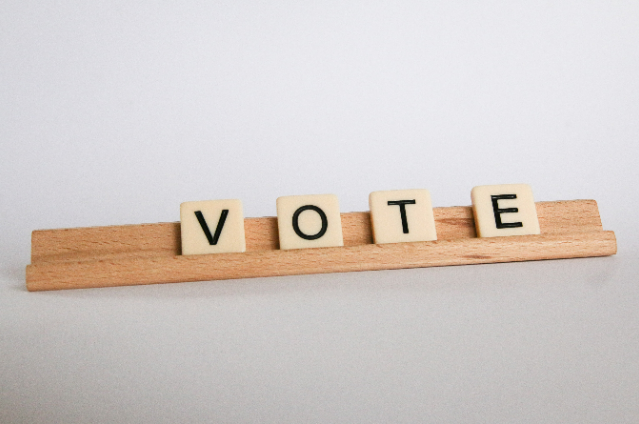
Universal Adult Franchise:
It means the extension of the right to vote to all adult citizens-both men and women without any qualification or discrimination. Under the system, the right to vote us extended to all the persons who have reached a prescribed age limit. In the UK, USA, USSR and India, the voting age is 18 years. The right to vote is given under adult franchise to every citizen without any property, educational, religious or such other qualifications. Every person gets a right to vote because he or she is a citizen. The right to vote is however not given to minors, lunatics etc. Aliens are denied the right to vote in USSR. Universal adult suffrage is the time-honoured principle of all the democratic countries of the world.
Arguments in favour:
- Democracy is a government of the people, for the people and by the people. It is based upon the concept of sovereignty of the people. It is therefore, important that the spirit of democracy can only be maintained if people are given the right to vote without any discrimination so that they could participate in their own governance.
- Political equality is a basic principle of democracy. It demands the right to vote must be equally distributed among all.
- The activities of government have a direct concern with the life of people. 'What toucheth all should be decided by all'. The end of the State is common welfare. Hence, the common people should determine the common welfare.
- The rights and interests of a class can be safeguarded only if it enjoys the right to vote.
Arguments against:
- To give the right to vote to ignorant masses is to court disaster. The masses do not possess the capacity to understand political affairs and to elect the right type of representatives. The right to vote should therefore be given only to those who can make a right use of it. As a critic said, 'Give suffrage to the ignorant, and they will fall into anarchy today and despotism tomorrow.'
- It is further argued that there must be certain qualifications for a voter. The qualifications of education must be installed in the system. J.S. Mill suggests that universal teaching should precede universal franchise.
- Some political philosophers are of the opinion that the right to vote should be granted to women.
- If the masses are given the right to vote, they shall be exploited by selfish individuals and political parties.
- Adult franchise leads to political corruption. Votes in the hands of the backward and illiterate persons are often sold for money.
Although, certain arguments have been advanced against universal franchise, it is now the accepted creed of the democratic world. With the spread of education and improvement in the material conditions of life, suffrage is tending to be universalized.
Qualifications of a Voter:
There is a good deal of controversy among political thinkers as to what the qualification of a voter should be.
a) Education:- A citizen must be educated before the right of vote is extended to him. Democracy in the hands of the uneducated is liable to be perverted.
The Lothian Committee pointed out, 'Illiteracy by no means implies that the individual is not capable of casting an intelligent vote on matters within the range of his own knowledge and experience.'
b) Property:- Certain political philosophers assert that the right to vote should be given to those who hold property. People having no property are irresponsible because they have nothing at stake. Edmund Burke is a great supporter of this argument.
c) Payment of Taxes:- J.S. Mill holds that payment of taxes by the citizens also holds an essential qualification.
d) Residence and Citizenship:- It is logical and natural that the right to vote should be given to citizens alone.
e) Age of maturity:- It is regarded as an essential qualification for a voter. The right to vote at the age of 18 is now widely accepted in many countries.
f) Moral qualifications:- The right to vote should be given to those who are mentally and morally fit. In accordance with this principle, bankrupts and criminals are not given the right to vote.
g) Sex:- Women were excluded from political franchise for a very long time. But now the right to vote has been extended to women in most of the states of the world. It is argued that suffrage is more necessary for women than for men as a means of self-protection.
Issue of Women suffrage
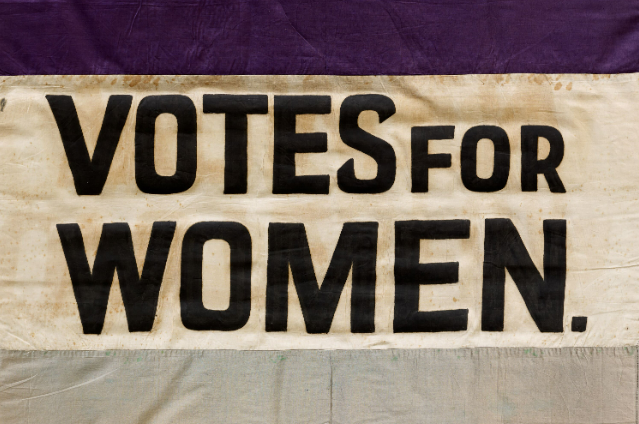
Photo by Birmingham Museums Trust on Unsplash
There has been a controversy among political thinkers as to whether women should be enfranchised or not.
Arguments in Favour of Suffrage for Women:
- It is illogical and irrational to deny the women the right to vote. J.S. Mill calls that women are more in need of this right because they are physically weaker than men and depend more upon law and society for protection.
- Restriction of suffrage due to difference of sex is against the very spirit of democracy. It is quite unjust that female population should be governed by men alone since it leads to the political subordinate of women by men.
- Women in every country enjoy civil rights. Exercise of civil rights is not possible without political rights because the latter are an essential guarantee of the former.
- Female suffrage is supposed to exercise a purifying, ennobling and refining influence on public life. It is bound to bring righteousness and purity in politics.
- Women in modern society are taking an equal part in all walks of life side by side with men. Many of them have given good proof of their ability in state services and in other fields of human activity.
Arguments against Suffrage for Women:
- A woman is the ministering angel of the home and maternity is her proper mission. If women take part in politics, it will simply rob them of their feminine qualities. It will result in the neglect of their home and children because home rather than politics should be the chief concern of women. This argument, however, does not have much of appeal because casting of vote after long periods does not in any way disturb the household routine of a woman.
- Enfranchisement of women is able to bring about a discord in the family life in case of disagreement between husband and wife or mother and children. If males and females in a family agree, it is just a wasteful duplication of votes. J.S. Mill refutes this argument and points out that female franchise adds to female prestige in the family and political education of the family.
- Some opponents of female suffrage point out that women are physically weaker than men and are unable to take an equal part in the harder spheres of life. It is unwise to give equal political rights to women because their sphere is distinct and separate from that of men. Advocates of female franchise point out that women are capable of competing with men in all the walls of life if they are given equal opprtunities with men.
- It is further pointed out that women have shown apathy and indifference towards politics in the countries where political rights have been given to them. But there is no reason why the political privilege of franchise should be denied to those who are willing to take advantage of it.
Although there are balancing arguments for and against female suffrage yet it is universally recognised now that women should have equal political rights with men. Every democratic country has extended the right to vote to women in spite of the jarring notes of opponents of female suffrage.
Proportional Representation
The Preferential System- The Single Transferrable Vote System:
It is also known as Hare or Andrae System. This system is widely prevalent and has been adopted by India for election of the Rajya Sabha, State Legislative Councils, the President and the Vice-President. This system works under the following conditions:
- There should be multi-member constituencies electing more than two members.
- The names of the candidates are printed on the ballot paper. A voter has got only one effective vote which may be cast in order of preference- first, second, third or as many preferences as there are seats to be filled in.
- A candidate must secure a certain quota of votes in order to be successful. There are several ways of determining this quota. The commonest method is to divide the total votes cast by the number of seats to be filled in plus one and add one to the quotient.
- Counting of votes begin with first preference votes. A candidate securing the prescribed quota of votes is declared elected and his surplus votes, if any, are transferred to the second preference indicated on the ballot papers. Now with the help of second preference votes transferred in this way, some of the candidates are declared elected. If all the candidates are not elected with second preference votes transferred in this manner third preference votes may be utilised. If some candidates secure a very small number of votes in the first preference and as such they have no chance of being elected with the transferred votes, their first preference votes are given to the second choice indicated on their ballot papers. In this way all the votes are utilised. This system of single transferrable vote has been adopted by a number of countries.
The List System:
Another form of proportional representation is known as the list system. It is called the list system because all the candidates are grouped together in lists according to their party affiliations. The voter votes primarily for a party list, he accepts the order of preference previously determined by the party. This system is in vogue in Belgium, Sweden, Denmark and Switzerland. It works under the following conditions:-
- There should be multi-member constituencies with a minimum of three members.
- Every political party put up its own list of candidates, for each constituency.
- Each voter may be allowed to cast one vote as there are seats to be filled in.
- A candidate in order to be successful must secure a certain quota of votes. The quota is determined by dividing the total votes cast by the number of seats to be filled in.
- The seats to which a political party is entitled are determined by dividing the total number of votes secured by the party by the quota prescribed. The fractional votes can be transferred to and from other constituencies.
Merits:
- It ensures representation to all shades of public opinion in proportion to their voting strength.
- Every voter is represented in the legislature by a real representative and not by one elected by others as is generally the case in the single member constituency system.
- The scheme ensures reasonable representation to minorities according to their voting strength.
- It is most suitable for countries inhabited by a number of racial and national minorities.
- It avoids minority representation and minority governments.
Demerits:
- The system of proportional representation gives rise to multiple political parties resulting in the formation of coalition Cabinets.
- This system encourages 'minority thinking' and often leads to class legislation. National interests are liable to be sacrificed on the altar of sectional interests.
- This system is very complex and involves so many difficulties. Complication of electoral machinery is bound to result in a decline of civic interests in the political process.
- It is not feasible in big constituencies having a large number of voters.
- This system is open to another objection because no satisfactory system of by-election has yet been devised under this scheme.
- In multiple constituencies, there is no direct contact between the voter and the representative.
- The minority interests are not served in this system.
Methods of Minority Representation
a) The Limited Vote Plan:- According to this method, there can be multi-member constituencies with a minimum of three members. Each voter is to cast only one vote for one candidate. A voter is allowed to cast a smaller number of votes than there are seats to be filled in.
b) The Cumulative Method:- Under this system a voter can cast as many votes for a smaller number of candidates than there are seats to be filled in.
c) Reservation of Seats:- Seats for the minority are reserved under this system to ensure the inclusion of the interests of that very community also.
Functional Representation:
It means that parliament means that parliament is elected by the various professional, vocational and functional groups like industry, trading corporations, medical associations, lawyers associations, etc. This system has been advocated by different writers like Wallas, the Webbs, Duguit and G.D.H. Cole. Wallas wanted the House of Lords to be elected on the basis of vocational and functional representation. The Webbs advocated two parliaments - Territorial Parliament and Social Parliament. Duguit advocated that 'all the great forces of the national life ought to be represented- industry, property, commerce, manufacturing, profession, and even science and religion.' G.D.H. Cole advocated guild socialism under which guild parliament representing industry shall legislate on economic matters.
Arguments in support:
- The prevalent territorial system is undemocratic and violates the spirit of democracy.
- It is pointed out that in the present industrial society, people have common interests in their professional group rather, than in the locality in which they live.
- It is further argued that in modern society vocational groups are more important than territorial locality.
- It is also pointed out that most of the legislation that modern parliament pass deals with industry, agriculture, trade, commerce and other vocational interests. These interests find no representation in Parliament even though they are vitally affected by that legislation. On the other hand, the members of Parliament elected on territorial basis are laymen, having no understanding and knowledge of the technical matters on which they legislate.
- While the consumer finds representation in a territorial parliament the producer is completely ignored even though he is a vital party of society. Today, the chief political issues are industrial issues and must be decided by the representatives of industry.
Examples of Functional Representation:
Under the Weimar Constitution ( 1919 ) of Germany, a National Economic Council was created. Similarly, under the Third and Fourth Republic of France a similar National Economic Council was established. Mussolini introduced thr system of occupational representation. In the USA, the National Planning Board came nearer such representation.
Arguments against:
- The experience of the working of the National Economic Councils in Germany and France has not been heartening. These Councils did not serve the purpose that they were intended for.
- The functional representation is defective in so far as it divides the society into so many sectional interests without proper integration.
- There can be no adequate basis to provide adequate and proportionate representation to various interests and vocations.
- Occupational groups shall have many diverse interests within itself. It will be impossible to give them proper representation.
- In modern societies elections are fought on party basis. This leads to negative party-politics where the leaders indulge in gambling at the expense of larger public welfare. They are found busy advancing their political careers and the public interest eventually succumbs.
- Democracy is based on the principle of equality of citizenship and is defined as government 'by the people'.
- Laski points out that the functional groups are 'not relevant to the purpose of legislative assembly.'
Direct Election and Indirect Election
Direct Election:- If the representatives are elected directly by the people, the method involved is known as Direct Election.
Indirect Election:- It is the method according to which people are supposed to elect an intermediary body, commonly known as electoral college, which is entrusted with the task of electing the representatives.
Advantages of Direct Election over Indirect Election:
- Direct Election establishes a contact between the voters and the representatives. The method of indirect election on the other hand is against the spirit of democracy.
- Under direct election, the voters develop an interest in public affairs. But the system of indirect election does not stimulate any interest in public affairs.
- Direct elections are advantageous because the representatives feel that they are responsible to the people. Indirectly elected representatives, however, do not feel so.
Disadvantages of Direct Election and Advantages of Indirect Election:
- It is considered that the direct election is not suitable for countries having a majority of illiterate people. Indirect election is very suitable for backward communities.
- Universal Adult Franchise makes direct election impossible. Indirect Election alone can remove this difficulty.
Glossary for some commonly used terms in context of Elections:
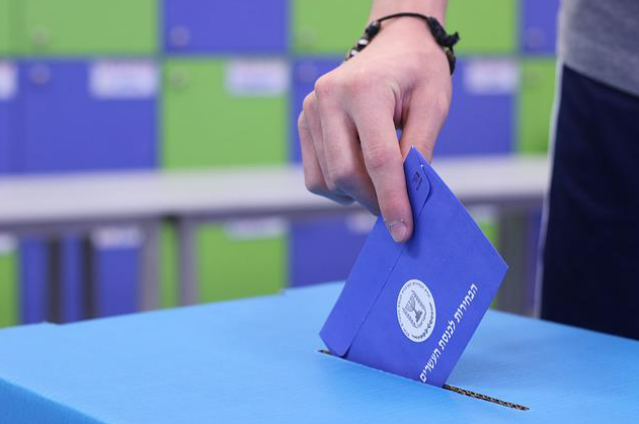
a) Separate Communal Electorates:- According to this system, a community supposed to elect a representative with its exclusive votes.
b) Joint Electorate:- This system implies mixed constituencies consisting of the voters of different communities.
c) Public voting:- According to this system, a voter declares before all, the name of the candidate in whose favour he wants to record his vote.
d) Secret Ballot:- Under this system, the voters records his vote secretly.
e) Instructed Representation:- The theory implies that representatives should act according to the instructions received from their voters from time to time.
f) Minority Representation:- It implies the system which provides representation to all sort of minorities in accordance with their voting strength.
g) Commercial Representation:- According to this system, commercial interests are separately represented in the legislature.
h) Single and Multi-Member Constituencies:- A constituency sending one representative is a single-member constituency and the one which sends more than one is known as multi-member constituency.
i) Bye-Election:- It is a re-election when a certain constituency falls vacant on account of registration or death of its representative.
Conclusion
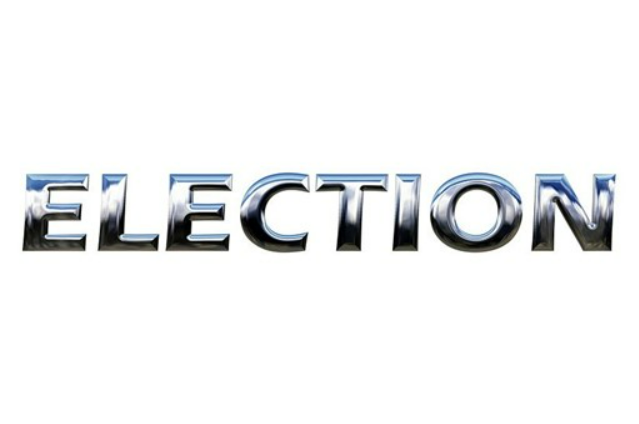
Elections form the bedrock of the largest democracy in the world. Elections provide a way to the people to assert their voice, opinion and choose the person whose priorities and ideas matches with them most. In India the elections are not new and they started taking place before the independence from the British rule itself. But before independence, the franchise was quite limited and very few were having rights to participate and vote. After independence, India adopted universal adult suffrage and each Indian got the right to vote.
The significance of elections is spell-bounding. Elections provide a way for the citizens of India to choose their votes in favour of the candidate of party whose views appeal to them. This ensures that the will of the people is reflected in the candidates that get elected. Elections in India are also a platform for the public to voice their resentment against a ruling party. By voting for other parties and helping elect a different government, citizens demonstrate that they possess ultimate authority. Elections open the door for new issues to be raised in public. If a citizen of India wishes to introduce reforms that are not the agenda of any parties, he or she is free to contest the elections either independently or by forming a new political party. Elections as a regular exercise, occuring every five years in India, the ruling parties are kept in check and made to consider the demands of the public. This works as a self-corrective system whereby political parties review their performance and try to appease the voters.
The importance of election in our constitution is high as it forms the fundamentals of democracy. A country as big as India can sustain democracy due to elections and the various events that take place because of it. The election is the basic essence of India's democracy. To conclude, in the words of Thomas Jefferson,
'We do not have government by the majority. We have government by the majority who participate.'
. . .
References:
- Indian Polity by M Laxmikanth.
- The Theory of Political Science by S.L. Kaeley.
- Class IX ( CBSE NCERT ) - Democratic Politics ( Chapters referred - What is democracy and why democracy?; Electoral Politics )

